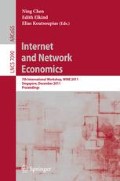Abstract
We study the power of a tournament organizer in manipulating the outcome of a balanced single-elimination tournament by fixing the initial seeding. This problem is known as agenda control for balanced voting trees. It is not known whether there is a polynomial time algorithm that computes a seeding for which a given player can win the tournament, even if the match outcomes for all pairwise player match-ups are known in advance. We approach the problem by giving a sufficient condition under which the organizer can always efficiently find a tournament seeding for which the given player will win the tournament. We then use this result to show that for most match outcomes generated by a natural random model attributed to Condorcet, the tournament organizer can very efficiently make a large constant fraction of the players win, by manipulating the initial seeding.
Access this chapter
Tax calculation will be finalised at checkout
Purchases are for personal use only
Preview
Unable to display preview. Download preview PDF.
References
Bartholdi, J., Tovey, C., Trick, M.: The computational difficulty of manipulating an election. Social Choice Welfare 6(3), 227–241 (1989)
Bartholdi, J., Tovey, C., Trick, M.: How hard is it to control an election. Mathematical and Computer Modeling, 27–40 (1992)
Braverman, M., Mossel, E.: Noisy sorting without resampling. In: SODA, pp. 268–276 (2008)
Coppersmith, D., Fleischer, L., Rudra, A.: Ordering by weighted number of wins gives a good ranking for weighted tournaments. In: SODA, pp. 776–782 (2006)
Erdős, P., Rényi, A.: On random matrices. Publications of the Mathematical Institute Hungarian Academy of Science 8, 455–561 (1964)
Feige, U., Peleg, D., Laghavan, P., Upfal, E.: Computing with unreliable information. In: STOC, pp. 128–137 (1990)
Fischer, F., Procaccia, A.D., Samorodnitsky, A.: On voting caterpillars:approximating maximum degree in a tournament by binary trees. In: COMSOC (2008)
Gibbard, A.: Manipulation of voting schemes: a general result. Econometrica 41 (1973)
Hazon, N., Dunne, P.E., Kraus, S., Wooldridge, M.: How to rig elections and competitions. In: COMSOC (2008)
Lang, J., Pini, M.S., Rossi, F., Venable, K.B., Walsh, T.: Winner determination in sequential majority voting. In: IJCAI (2007)
Russell, T.: A computational study of problems in sports. University of Waterloo PhD Disseration (2010)
Russell, T., Walsh, T.: Manipulating tournaments in cup and round robin competitions. In: Algorithmic Decision Theory (2009)
Satterthwaite, M.A.: Strategy-proofness and arrow’s conditions: Existence and correspondence theorems for voting procedures and social welfare functions. Journal of Economic Theory 10 (1975)
Slater, P.: Inconsistencies in a schedule of paired comparisons. Biometrika 48(3/4), 303–312 (1961)
Stanton, I., Vassilevska Williams, V.: Rigging tournament brackets for weaker players. In: IJCAI (2011)
Vassilevska Williams, V.: Fixing a tournament. In: AAAI, pp. 895–900 (2010)
Vu, T., Altman, A., Shoham, Y.: On the complexity of schedule control problems for knockout tournaments. In: AAMAS (2009)
Vu, T., Hazon, N., Altman, A., Kraus, S., Shoham, Y., Wooldridge, M.: On the complexity of schedule control problems for knock-out tournaments. In: JAIR (2010)
Young, H.P.: Condorcets theory of voting. The American Political Science Review 82(4), 1231–1244 (1988)
Author information
Authors and Affiliations
Editor information
Editors and Affiliations
Rights and permissions
Copyright information
© 2011 Springer-Verlag Berlin Heidelberg
About this paper
Cite this paper
Stanton, I., Vassilevska Williams, V. (2011). Manipulating Stochastically Generated Single-Elimination Tournaments for Nearly All Players. In: Chen, N., Elkind, E., Koutsoupias, E. (eds) Internet and Network Economics. WINE 2011. Lecture Notes in Computer Science, vol 7090. Springer, Berlin, Heidelberg. https://doi.org/10.1007/978-3-642-25510-6_28
Download citation
DOI: https://doi.org/10.1007/978-3-642-25510-6_28
Publisher Name: Springer, Berlin, Heidelberg
Print ISBN: 978-3-642-25509-0
Online ISBN: 978-3-642-25510-6
eBook Packages: Computer ScienceComputer Science (R0)

